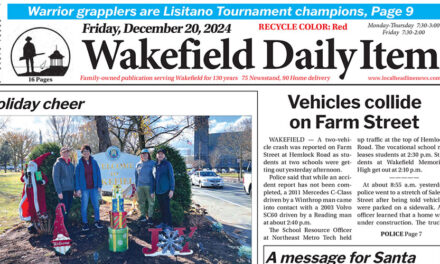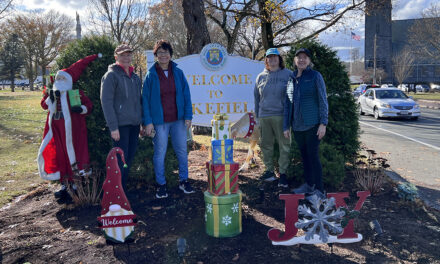By MARK SARDELLA
WAKEFIELD — With snow totals mounting and no letup in sight, both the Finance Committee and the Board of Selectmen this week authorized a snow and ice overdraft in the amount of $800,000.
The FinCom vote came at the end of their meeting last night, following a similar vote by the selectmen at their meeting on Wednesday. Municipalities are allowed to expend necessary funds above those already budgeted to deal with snow removal needs and defer appropriations until the following fiscal year.
Due to the recent series of punishing storms, the DPW has long since exhausted the $650,000 budgeted for snow and ice removal for this year. Town Administrator Stephen P. Maio told the FinCom last night that the town has spent approximately $1.2 million dealing with the 82 inches of snow that has fallen on the town so far this year, and all of the bills are not in yet. That means that the town is already more than $540,000 over budget, Maio added.
Maio noted that it costs the town about $14,000 per inch for snow removal and cleanup. A major storm predicted for this weekend will further deplete the already overextended budget.
Maio said that if the full amount of the overdraft is not needed, the money will not be expended and will be returned to town coffers. Last night’s FinCom vote to authorize the overdraft was unanimous.
—————
The Finance Committee also scrutinized a number of FY 2016 departmental budgets last night.
Town Accountant Kevin Gill began with the General Insurance budget and was joined for this presentation by the town’s insurance agent, John Spinello of Hartshorne Insurance Agency.
Gill said that the FY 2016 General Insurance budget was being increased by $35,050 to a total of $355,265. Gill said that the main reason for the increase was the new Galvin Middle School going online. For FY 2015, Gill said, the Galvin was covered by the contractor’s insurance.
FinCom member Daniel Sherman asked about a significant increase in vehicle insurance. Spinello explained that it was mainly a function of the insurance company moving money around to their own advantage within the overall budget and not due to more motor vehicles or higher rates.
Gill presented the Workers Compensation budget at a total of $476,667, up $25,847 over FY 2015. He said that the increase was due to an increase in the experience modification, a rate hike and an increase in payroll.
Explaining the experience modification, Spinello said that the town does continue to have losses, although he added that things are getting better.
FinCom member Wayne Tarr asked if the town utilized a practice of bringing injured employees back for “light duty” before they may be ready to resume their regular jobs. He said that paying injured employees for light duty such as answering phones or filing can decrease the amount of Workers’ Comp claims and give injured employees incentive to return to work.
Maio said that he wasn’t sure to what extent light duty was currently implemented but said it was a good suggestion and he would look into it.
FinCom members had many questions about the Workers’ Comp budget, particularly regarding the experience rating system. Spinello said that it was the number of claims over $5,000 that has hurt the town. He noted that both frequency and severity of claims were factors and the town has experienced both.
Still, he said, the safety education program for town employees implemented over the last several years has resulted in things moving in the right direction.
“You can’t eliminate all claims,” Spinello said. “You just have to cut down.”
Director of Assessments Victor Santaniello was on hand for the presentation of the $191,219 Assessors Department budget. Gill said that the budget was up $6,885 over last year due to negotiated contractual salary increases and an increase in the use of outside contractors as a result of a spike in valuations for personal property.
Maio noted that the sharing of Santaniello’s services with Reading is working well and that Wakefield is spending less on this department than it did in FY 2013.
Gill said that the Selectmen’s $381,696 budget was up $3,437, all of it in personal services due to contractually negotiated salary increases. Gill noted that the salary of the Town Planner is included in the Selectmen’s budget.
Gill said that his own Accounting Department budget was up $27,759 to a total of $357,058. Gill said that the budget included $34,000 for equipment rental (copiers and printers) and $49,500 to Powers and Sullivan Accountants for audit services.
FinCom members had a number of questions about the increase to this budget. They were surprised to learn that the annual audit had not been put out to bid in recent years. They also wondered why equipment like copiers and printers were being leased instead of purchased, and why these costs were not part of the capital budget.
Maio and Gill said that whether rented or purchased, in most cases the outlay each copier and printer was less than the $5,000 threshold established for capital expenses.
Moving to the Animal Inspector’s budget, Gill said that the request was for $68,379, an increase of $878 for negotiated salary increases.
Gill said that the $12,125 Parking Clerk’s budget was down $8,766 due to a reorganization of that department. He said that the Animal Control Officer was now taking on the Parking Clerk’s duties, and the retired former Parking Clerk is now the hearing officer. Gill said that the Parking Clerk brings in about $90,000 in annual revenue.
Gill presented the $213,131 FY 2016 budget for Street Lights. In response questions from FinCom members, Maio said that the MGLD was pursuing the use of more energy efficient bulbs and fixtures for street lighting.
Gill said that the Historical Commission budget was increased by $900 to $2,000. FinCom member Joseph Bertrand said that the increase was to help facilitate a program to raise awareness of homes listed as significant sites and to educate their owners as to their rights and obligations.
The Professional Medical budget, used mainly for pre-employment and return-to-work physicals, was presented at a level-funded $8,350.




